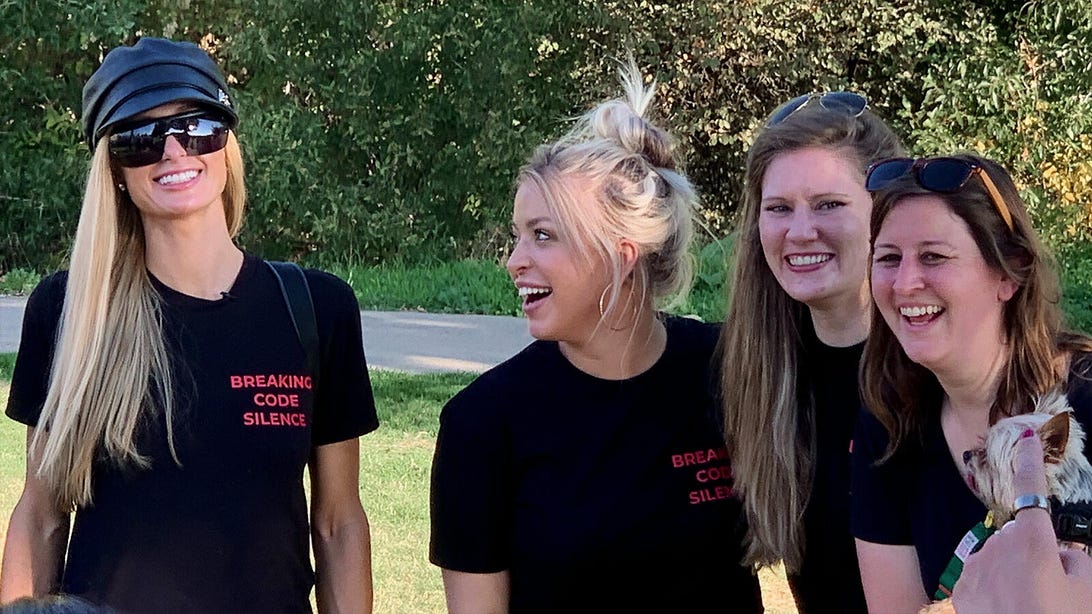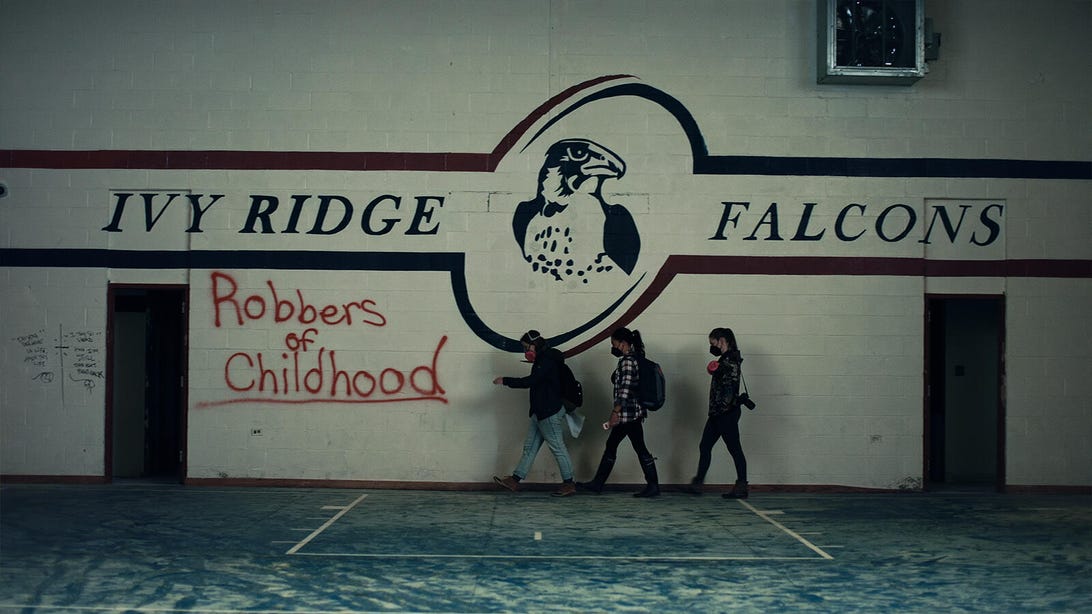Join or Sign In
Sign in to customize your TV listings
By joining TV Guide, you agree to our Terms of Use and acknowledge the data practices in our Privacy Policy.
Netflix's The Program: Where the Abusers Are Now, and How the Docuseries Is Linked to Paris Hilton
Ivy Ridge Academy was a teenage rehabilitation nightmare

Paris Hilton, Caroline, Alexa, and Katherine Kubler, The Program: Cons, Cults, and Kidnapping
NetflixKatherine Kubler spent 15 months against her will at the Academy at Ivy Ridge in upstate New York before her father finally pulled her from the program. Those months were more than enough to cause permanent trauma to Kubler and other teens like her.
Now, some of those former students are speaking out in Netflix's three-part documentary, The Program: Cons, Cults and Kidnapping.
In the series, director Kubler investigates the origins of the program, what it sold itself as versus the abusive system it was, and examines how some of the power players continue to get away with this behavior years after the school's true nature came to light.
The series is full of shocking and disturbing moments, including abuse, first-hand interviews, and retrieved documents that were found in the abandoned school, leading to more questions and sheer outrage.
Read on to learn more about the documentary, how it's linked to Paris Hilton, and what happened to those at the center of it all.
More on Netflix:
- The Best TV Shows on Netflix Right Now
- The Best Movies on Netflix Right Now
- What's New on and Coming to Netflix
What Is The Program?
The program refers to the actual program that Ivy Ridge used to keep its students in line. Ivy Ridge was a "scared straight" boarding school (though it was not actually accredited) that operated in the 2000s under the guise of helping troubled teens change their behavior. As the documentary explains, the rehabilitation program was designed so kids could never actually graduate and included rules like no going outside, no looking out the window, and no smiling. Students would achieve various levels of the program on a scoring scale and earn "privileges," like wearing their hair down, based on their level.
Points would be deducted for various infractions. According to Kubler, learning the rules took days, as there were pages and pages of rules to memorize and follow.
What Were Conditions Like in The Program?
In the first episode, Kubler and fellow former students reveal the varying layers of what living at Ivy Ridge was like. Officials separated students by gender and assigned them four to a dorm. Often, though, the mattresses would be pulled outside in the hallway so students could be monitored, and they had to sleep with their arms and legs outstretched so that their limbs were visible at all times.
The students were also forced to participate in rituals for hours at a time, were deprived of basics like sleep and food if they didn't comply, and were forced to perform acts meant to embarrass them and strip them of their dignity in front of other students.
According to the doc, the kids suffered intense emotional abuse in which they were told they were responsible for things like their parents' deaths and other traumatic moments in their lives. Meanwhile, the series also digs into instances of sexual abuse and how those with power abused their positions. Physical abuse was also an issue, as officials tackled students or forced them into isolation for extended periods.
Throughout the entire time, students were not allowed to complain to their parents about their living situation or ask to come home. Their letters and phone calls were monitored, and attempting to break those rules could take away any earned points. In other words, the only thing they could do was comply.
How Did Students Arrive at The Program?
Kubler also examines the parents' participation in the program throughout the series as she embarks on a journey of healing with her father. Through research, she learns the school convinced parents they were sending their troubled teens to a school that would help their behavior through positive activities and scientific methods. These parents spent thousands and thousands of dollars in the process.
In reality, Kubler showcases how those in charge had no qualifications to be in charge of children and examines how the FDA doesn't oversee mental health care. As a result, there was no governing body when it came to the school's standards of care. Through that exploration, Kubler also compares some of the methods used to those from cults, setting up a terrifying picture.
What Happened to the Kids?
One of the biggest revelations in the docuseries comes early on: Once Ivy Ridge was abandoned in 2009, no one thought to eliminate all the evidence. So it's by returning to the building and sorting through piles of documents and hours of footage that the docuseries comes together, painting a harrowing picture of what went down.
Several of the children who suffered at Ivy Ridge participate in the doc, while others are just trying to move on with their lives. But many remain who want answers and justice for the crimes committed against them.

The Program: Cons, Cults, and Kidnapping
NetflixWhat Happened to Those in Charge?
By the series' final episode, Kubler goes deep into why and how this program — and several others like it across the United States and Mexico — was allowed to exist. All she needed to do was follow the money.
By going down that path, Kubler discovered the link between Robert "Bob" Lichfield, the founder of the World Wide Association of Specialty Programs and Schools (WWASP), and Ivy Ridge, which was WWASP-affiliated.
Unfortunately, WWASP continues to have ties with more than 25 boarding schools and youth programs worldwide, and earns millions of dollars every year while teens reportedly continue to suffer from abuse. There have been many legal battles since then, and the Utah-based organization was subsequently dissolved, but these programs continue to exist today.
So far, as per the doc, Lichfield continues to operate as per usual with no consequences.
More true crime:
- Dancing for the Devil: The 7M TikTok Cult on Netflix: Where Are They Now?
- Ashley Madison: Sex, Lies & Scandal: The Biggest Reveals From Netflix's Scandalous Docuseries
- Netflix's What Jennifer Did: Where Is Jennifer Pan Now and Did She Kill Her Parents?
- HBO's The Jinx Is Back: Here's What to Know About Part 2 and Why You Should Watch
What to Watch After The Program
The stories in this docuseries are harrowing, but these survivors aren't the only ones speaking out and trying to spread the truth. Paris Hilton has previously spoken out about her experience with the boarding school system in her documentary, This Is Paris. (Watch for Hilton cameos throughout The Program as well.)
Meanwhile, Netflix's Hell Camp Teen Nightmare also examines the horrors of this industry. The hour-and-a-half film is now available to stream.
The Program: Cons, Cults and Kidnapping is now streaming on Netflix.